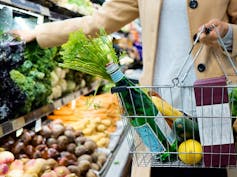Whether you’re at a party, a family gathering or even at work, chances are you’ve heard someone say: “I’m on the (insert name) diet. It’s amazing!” Or maybe you’ve been the one to say it. Either way, it’s not surprising.
Diet trends are as old as, well, the grapefruit diet of the 1930s. But in today’s social media world, endless online wellness hacks, fad diets and nutrition misinformation are spreading faster than ever.
Why? Quick-fix regimens gain traction easily for many reasons. Our diets are deeply personal and, for some people, evoke a sense of devotion, almost like a religion.
Table of Contents
The science of food choices
Food choices are complex. When we go to a supermarket, what we put in our basket is influenced by many factors.
Some are biological, like our brain’s tendency to prefer high-calorie foods. Others are cultural, like the staples we grew up eating. And some are basic business strategy, like the store we shop at nudging our choices by placing certain products at eye level.
(Unsplash)
Nutrition and public health scientists, however, largely agree that when it comes to eating behaviour, the food environment is key. The food environment refers to the complex systems that determine which types of food we have access to. It has a physical component, such as the grocery stores around our neighbourhood or workplace, but it also includes other important and highly effective factors like marketing.
In our 2023 meta-analysis, we found that exposure to food ads activated brain regions involved in eating behaviour. When people, regardless of age, were exposed to food ads, they ate more food afterwards.
This evidence, alongside a vast body of research, highlights just how strongly our environment influences what we eat, and how much. It also raises an important question: if traditional media and marketing can shape our eating behaviours, how much stronger is that influence today in our infodemic-driven digital reality?
The misinformation problem
Health misinformation on TikTok, Instagram and the like, is nothing new. But during the COVID-19 pandemic, with more time at home, the perfect recipe for the sharing of faulty claims emerged. And the nutrition space was no exception.
Countless personalities on social media spread nutrition “advice” that should be avoided. Two examples that have persisted on social media are the carnivore diet — based solely on eating animal products — and the anti–seed oil movement, which blames seed oils for many diet-related diseases. These controversial and thoroughly debunked recommendations have become so influential that they are even endorsed by the U.S. Secretary of Health.
(Google Trends), Author provided (no reuse)
A 2022 study reviewed more than 60 articles on online nutrition content, and about half concluded that the information quality was low.
Perhaps the more notable aspect, however, is the fervent and often combative way people react during these debates. Why do people display such passion — even tribalism — when discussing food and nutrition? What we eat and what we believe about our food runs deep. So deep, in fact, that it can become part of who we are.
Food and personal identity
Food is connected with identity in intricate ways. It acts as a socio-cultural force that shapes how we see ourselves. But certain traits that overlap with believing in conspiracy theories, such as relying too much on intuition and being antagonistic, can leave some particularly vulnerable to misinformation. They encounter nutrition-related misinformation online and become deeply entrenched in a specific diet and lifestyle.
Adopting a fad diet can also mean finding a community, or at least, a sense of belonging. It’s not just about following a guru figure proclaiming the diet’s benefits; it’s also about dozens of peers confirming those benefits, sharing tips and recounting their experiences. This creates an echo chamber that reinforces beliefs and shields them from external skepticism.
It doesn’t help that many claims about fad diets are framed in almost religious terms. In a 2015 Slate piece, Alan Levinovitz, professor of religion at James Madison University, wrote:
“Evil foods harm you, but they are sinfully delicious, guilty pleasures. Good foods, on the other hand, are real and clean. These are religious mantras, helpfully dividing up foods according to moralistic dichotomies. Of course, natural and processed, like real and clean, are not scientific terms, and neither is good nor evil. Yet it is precisely such categories, largely unquestioned, that determine most people’s supposedly scientific decisions about what and how to eat.”
Elevating claims about the healthfulness of certain diets to the level of the sacred is a striking phenomena. So much so that, for some, criticism of a diet can feel like criticism of the self. This identity-driven attachment is one reason why fad diets thrive on social media. They spread because they offer people something deeper: moral clarity and even purpose.
So the next time you see an influencer promoting their diet, ask yourself: are they sharing evidence-based advice in a composed and balanced way, or are they overly passionate, alarmist and entrenched in their views? If it’s the latter, you may have just spotted a misinformation red flag.
























